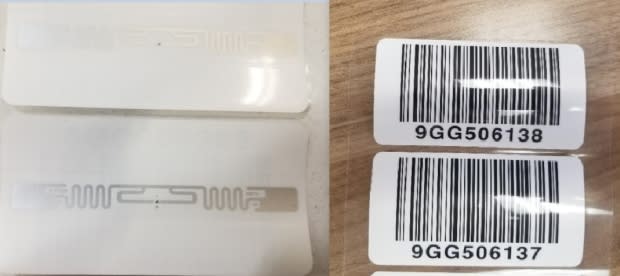Why more municipalities are putting radio-frequency tags on garbage bins
Tiny tags are allowing Canadian municipalities to track residents' trash with increasing sophistication.
This month, personal protective equipment-donning workers from GFL Environmental Inc. will be installing small barcode-like stickers on the more than 16,000 waste bins and organic carts in the Alberta-Saskatchewan border city of Lloydminster.
The stickers hold radio-frequency identification (RFID) chips that, when paired with a reader, allow the carts to be tracked wirelessly.
RFID tags are hardly new. They have been used for more than a decade to track items like airline baggage, library books, passports, rental cars, cattle and house pets. But their application in the waste-management sphere is less established.
Many cities that have installed the tags, like Lloydminster, are in the early stages of harnessing their potential.

Privacy concerns
RFID tags have long raised privacy concerns over the tracking of personal information.
More than a decade ago, Canadian privacy commissioners and other industry experts raised problems with the RFID technology used in enhanced driver's licences.
Karen Dela Rosa, senior manager of waste services for the City of Lloydminster, said the border city's tags will only collect dates and times of collection.
The city has no plans to track what individual households are throwing away and data will be analyzed in aggregate.
"This is not a surveillance system," she said.
Listen to Karen Dela Rosa talk about RFID technology on CBC Edmonton's Radio Active
Dela Rosa said the new system will also allow the city to better investigate bin pick-up problems and provide residents with better customer service.
More cities track trash with tags
Lloydminster is not the only municipality experimenting with this technology.
RFID tags are also being used in waste management systems in Prince George, B.C., Fort McMurray and Ontario's Peel Region.
The City of Beaconsfield in Quebec uses the tags as part of its "pay as you throw" program, meaning residents pay according to the size of bin they use and how often they put it out for collection. (Garbage weight does not factor into the equation.)
Beaconsfield residents who throw out less garbage pay less in fees and the city claims the system is cheaper to run, more equitable and environmentally friendly.
The City of Calgary, which has black garbage bins already equipped with RFID tags, is considering a similar program.
The City is surveying residents this month and preparing to present a pilot plan to city council by the spring of 2021.
Should council approve the plan, it would likely be rolled out first to a small subset of Calgarians before going city-wide, said Wunmi Adedipe, a business strategist for the City.
"We're exploring this and we're going to be relying heavily on customer feedback," she said.
The City of Edmonton is currently testing the technology with two city-owned vehicles and residents participating in a cart rollout pilot.
Spokesperson Anna Kravchinsky said in an email that if results from the pilot are positive, the city will look to extend the RFID program city-wide.
Cheap but not without challenges
RFID technology is cheap — each tag costs mere cents — but it comes with reliability and security costs, according to Omid Abari, an assistant computer science professor at the University of Waterloo who has researched how tags perform in a variety of applications.
The tags have short ranges and can be tampered with, he said, so municipalities should be careful to ensure tag-readers pick up accurate data from the right tags.
"Typically, they don't have very good security," he said.
Abari said he predicts RFID tags will become increasingly common in homes, especially as the technological challenges with their use are becoming resolved.

